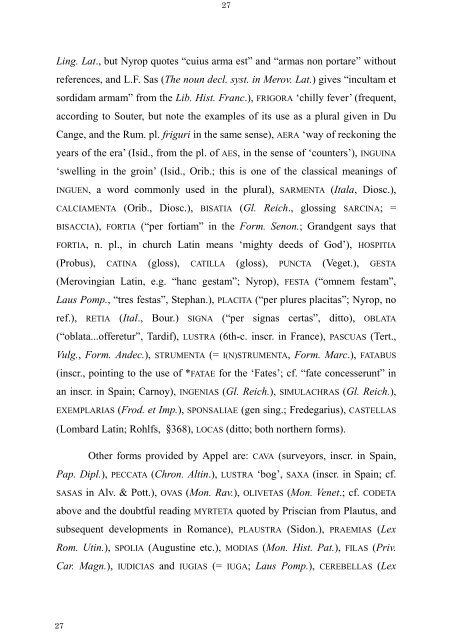The Latin Neuter Plurals in Romance - Page ON
The Latin Neuter Plurals in Romance - Page ON
The Latin Neuter Plurals in Romance - Page ON
You also want an ePaper? Increase the reach of your titles
YUMPU automatically turns print PDFs into web optimized ePapers that Google loves.
27<br />
27<br />
L<strong>in</strong>g. Lat., but Nyrop quotes “cuius arma est” and “armas non portare” without<br />
references, and L.F. Sas (<strong>The</strong> noun decl. syst. <strong>in</strong> Merov. Lat.) gives “<strong>in</strong>cultam et<br />
sordidam armam” from the Lib. Hist. Franc.), FRIGORA ‘chilly fever’ (frequent,<br />
accord<strong>in</strong>g to Souter, but note the examples of its use as a plural given <strong>in</strong> Du<br />
Cange, and the Rum. pl. friguri <strong>in</strong> the same sense), AERA ‘way of reckon<strong>in</strong>g the<br />
years of the era’ (Isid., from the pl. of AES, <strong>in</strong> the sense of ‘counters’), INGUINA<br />
‘swell<strong>in</strong>g <strong>in</strong> the gro<strong>in</strong>’ (Isid., Orib.; this is one of the classical mean<strong>in</strong>gs of<br />
INGUEN, a word commonly used <strong>in</strong> the plural), SARMENTA (Itala, Diosc.),<br />
CALCIAMENTA (Orib., Diosc.), BISATIA (Gl. Reich., gloss<strong>in</strong>g SARCINA; =<br />
BISACCIA), FORTIA (“per fortiam” <strong>in</strong> the Form. Senon.; Grandgent says that<br />
FORTIA, n. pl., <strong>in</strong> church <strong>Lat<strong>in</strong></strong> means ‘mighty deeds of God’), HOSPITIA<br />
(Probus), CATINA (gloss), CATILLA (gloss), PUNCTA (Veget.), GESTA<br />
(Merov<strong>in</strong>gian <strong>Lat<strong>in</strong></strong>, e.g. “hanc gestam”; Nyrop), FESTA (“omnem festam”,<br />
Laus Pomp., “tres festas”, Stephan.), PLACITA (“per plures placitas”; Nyrop, no<br />
ref.), RETIA (Ital., Bour.) SIGNA (“per signas certas”, ditto), OBLATA<br />
(“oblata...offeretur”, Tardif), LUSTRA (6th-c. <strong>in</strong>scr. <strong>in</strong> France), PASCUAS (Tert.,<br />
Vulg., Form. Andec.), STRUMENTA (= I(N)STRUMENTA, Form. Marc.), FATABUS<br />
(<strong>in</strong>scr., po<strong>in</strong>t<strong>in</strong>g to the use of *FATAE for the ‘Fates’; cf. “fate concesserunt” <strong>in</strong><br />
an <strong>in</strong>scr. <strong>in</strong> Spa<strong>in</strong>; Carnoy), INGENIAS (Gl. Reich.), SIMULACHRAS (Gl. Reich.),<br />
EXEMPLARIAS (Frod. et Imp.), SP<strong>ON</strong>SALIAE (gen s<strong>in</strong>g.; Fredegarius), CASTELLAS<br />
(Lombard <strong>Lat<strong>in</strong></strong>; Rohlfs, §368), LOCAS (ditto; both northern forms).<br />
Other forms provided by Appel are: CAVA (surveyors, <strong>in</strong>scr. <strong>in</strong> Spa<strong>in</strong>,<br />
Pap. Dipl.), PECCATA (Chron. Alt<strong>in</strong>.), LUSTRA ‘bog’, SAXA (<strong>in</strong>scr. <strong>in</strong> Spa<strong>in</strong>; cf.<br />
SASAS <strong>in</strong> Alv. & Pott.), OVAS (Mon. Rav.), OLIVETAS (Mon. Venet.; cf. CODETA<br />
above and the doubtful read<strong>in</strong>g MYRTETA quoted by Priscian from Plautus, and<br />
subsequent developments <strong>in</strong> <strong>Romance</strong>), PLAUSTRA (Sidon.), PRAEMIAS (Lex<br />
Rom. Ut<strong>in</strong>.), SPOLIA (August<strong>in</strong>e etc.), MODIAS (Mon. Hist. Pat.), FILAS (Priv.<br />
Car. Magn.), IUDICIAS and IUGIAS (= IUGA; Laus Pomp.), CEREBELLAS (Lex









